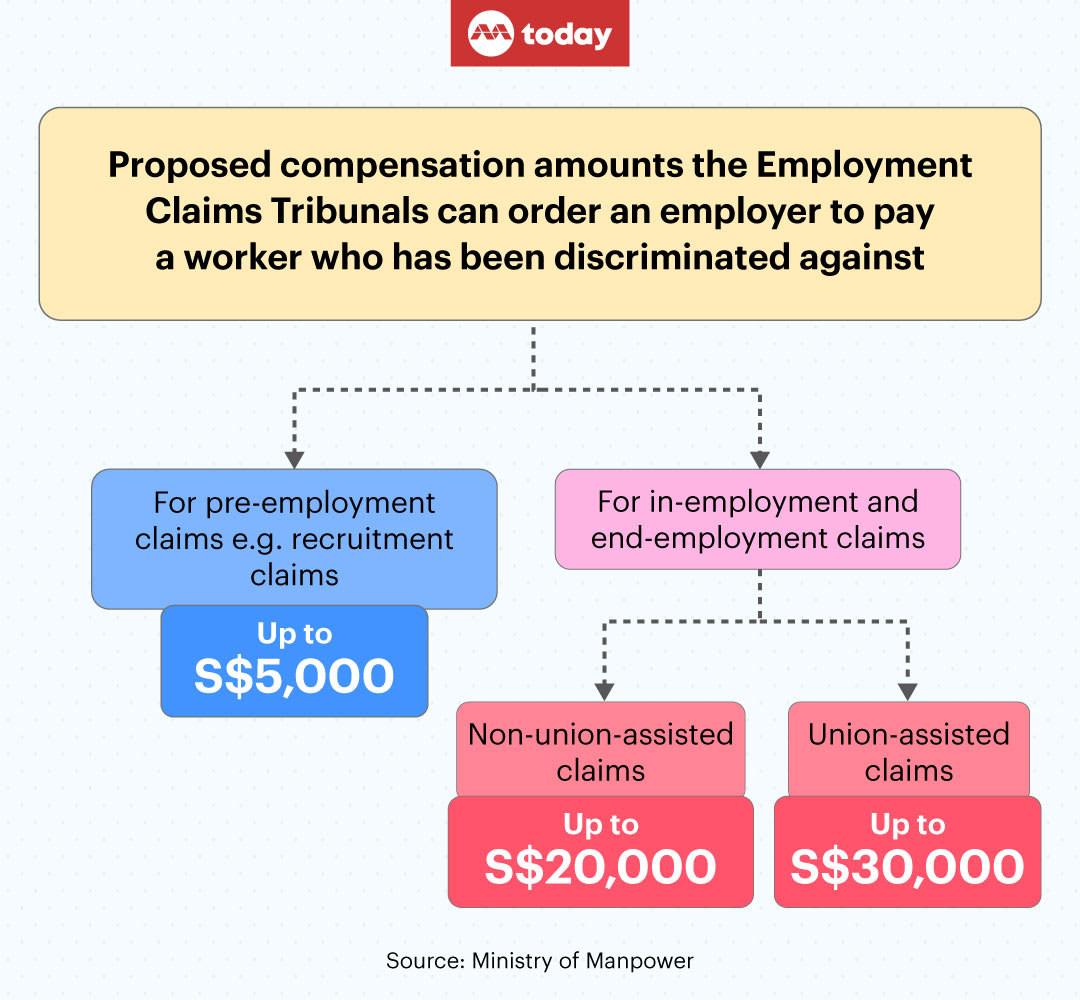Formal apology, up to S$30,000 compensation to affected workers on the cards for companies that practise workplace discrimination
SINGAPORE — Aggrieved employees may soon be able to seek redress from their companies if their employers discriminate against them at work, a committee comprising employers, the labour movement and the Government has recommended.

- The Tripartite Committee on Workplace Fairness recommended legislation to help workers facing workplace discrimination in its interim report published on Feb 13
- Under the recommended laws, discriminated workers will be able to seek redress in the form of monetary or non-monetary compensation after mediation
- They may also have their claims heard at the Employment Claims Tribunals if mediation fails
- The recommended legislation will cover discrimination related to the broad areas of age, nationality, sex, race and disability
- Legislation is expected to be tabled in Parliament by the second half of 2024
SINGAPORE — Aggrieved employees may soon be able to seek redress from their companies if their employers discriminate against them at work, a committee comprising employers, the labour movement and the Government has recommended.
If the proposed Workplace Fairness Legislation is accepted and enshrined into law, a new mediation process can legally compel errant employers to issue a formal apology to their employee and compensate the worker up to S$30,000.
Employers may also be required to reconsider the employee for another job, or have the employee go for another interview under a different interview panel.
These proposed moves form part of the 20 recommendations put forth in an interim report by the Tripartite Committee on Workplace Fairness on Monday (Feb 13).
In a joint statement, the National Trades Union Congress (NTUC), the Singapore National Employers Federation (SNEF), and the Ministry of Manpower (MOM) said that the report is a "significant step forward" to protect workers from discrimination.
The recommendations are aimed at tackling the problem of workplace discrimination linked to age, nationality, sex, marital status, pregnancy status, race and mental health condition, among other things.
The interim report is expected to be finalised later this year.
WHY IT MATTERS
If enshrined into law, the proposed moves will give people facing workplace discrimination legal teeth to seek redress at all stages of their employment such as during hiring, promotion and dismissal.
At present, only guidelines are in place for employers in relation to fair employment practices, known as the Tripartite Guidelines on Fair Employment Practices.
Under these current guidelines, affected employees may seek redress only if they are wrongfully dismissed, which could only lead to the suspension of work passes for foreign workers. Such cases may or may not be related to workplace discrimination.
However, this also means that companies that hire only resident workers are not subject to penalties.
The proposed protections against workplace discrimination will support Singapore’s key social and economic objectives and promote greater workforce participation by mature workers, women, persons with disability and those with mental health conditions, SNEF, NTUC and MOM said.
Speaking to the media at the MOM building on Monday, Manpower Minister Tan See Leng said that the new legislation will complement and not replace the Tripartite Guidelines on Fair Employment Practices.
"The Tripartite Committee on Workplace Fairness recognises the value of the Tripartite Guidelines on Fair Employment Practices and has proposed to retain them to continue to hold up the overarching principles of fair and merit-based employment for all workers," Dr Tan said.
In August 2021, Prime Minister Lee Hsien Loong said in his National Day Rally speech that the Government will enshrine workplace discrimination guidelines into law.
The move to legislate against workplace discrimination came after repeated calls made by Members of Parliament for fairer hiring practices here through improved standards and practices of human resource departments, and stiffer enforcement and penalties against firms with discriminatory hiring practices.
WHAT THE LEGISLATION WILL COVER
The proposed legislation will cover the following areas of discrimination:
- Age
- Nationality
- Sex, marital status, pregnancy status and caregiving responsibilities
- Race, religion and language
- Disability and mental health conditions
These areas make up the majority of the more than 300 complaints of workplace discrimination that the Tripartite Alliance for Fair and Progressive Employment Practices (Tafep) and MOM receive yearly.
These areas were also recommended by the committee because they support Singapore’s key social and economic objectives, such as ensuring that Singaporeans receive fair consideration for job opportunities.
On why other forms of discrimination, such as those against sexual orientation were not covered, Dr Tan said that the committee must be "judicious" in deciding which aspects of discrimination to enshrine in law because introducing such laws against discrimination is a "very significant change".
He stressed that all forms of workplace discrimination will not be tolerated. This is part of Singapore's national policy and is reflected in the Tripartite Guidelines on Fair Employment Practices, which covers all forms of discrimination.
He said that the current recommended laws are "basic building blocks" on which the committee wants to start.
However, in time to come as the system gets "more ingrained", the committee will be prepared to consider other forms of discrimination, he added.
Small companies with fewer than 25 employees will be exempted from the legislation for the first five years to give them time to adjust to the changes.
Dr Robert Yap, president of SNEF, said that small companies such as neighbourhood shops may not have the manpower and resources to put in place formal policies and processes to comply with legislation.
However, they are still expected to abide by the principles of the Tripartite Guidelines on Fair Employment Practices during their exemption period, he added.
WHAT THE PROPOSED LAWS ARE
The legislation will provide for mediation as the main avenue to address discrimination complaints, with recourse to the Employment Claims Tribunals if mediation fails.
If workers report workplace discrimination, they may go to the Tripartite Alliance for Dispute Management (TADM) for mediation.
TADM offers advisory and mediation services to help workers and employers manage disputes.
During the mediation, the focus will be on correcting errant practices by the employer and mending the relationship between the company and worker where possible.
Monetary and non-monetary remedies will be available to workers as part of the settlement with their employers after mediation.
Some examples of non-monetary remedies include having the employer reinstate an employment offer or providing an apology to the worker.
The employer may also commit to reconsidering the employee for another job or have the worker re-do an interview under a different interview panel.
Monetary compensation will be considered as part of the settlement in some instances.
If both parties are unable to come to a settlement through mediation, the worker may refer the case to the Employment Claims Tribunals where the parties will go through another mandatory mediation process and a hearing.
If the claim is upheld, the tribunal can award a compensation amount of up to S$5,000 for pre-employment discrimination, such as recruitment claims.
It can also award a compensation amount of up to S$20,000 for non-union members and S$30,000 for union-assisted workers. These amounts are meant for workers who faced discrimination during the period of employment or at the end of their employment.

WHAT ABOUT FRIVOLOUS CLAIMS?
If the tribunal concludes that claims raised by a worker are frivolous or vexatious, they can award costs of up to S$5,000 to be paid by the worker to the company.
For example, a worker may insist on pursuing his claim despite being advised by Tafep during the mediation process that he has no grounds to do so.
If the worker insists on going to the tribunal for his case, the tribunal may award costs to be paid to the company if the claim is found to have no grounds during the hearing.
Dr Yap of SNEF said employers were afraid that legislation could result in an increase in the number of frivolous claims.
They had talked to him about it, saying that companies will have to invest a huge amount of time and resources to rebut false allegations.
Therefore, they welcomed the move to fast-track frivolous claims to the Employment Claims Tribunals and have costs awarded to the company, Dr Yap added. This would help to deter false claims.
WHAT HAPPENED PREVIOUSLY?
The move to enshrine guidelines for fair employment practices came on the back of efforts over the decades by the Government to improve workplace fairness.
For example, Tafep was formed in 2006 to promote the adoption of fair, responsible and progressive employment practices.
A year later, tripartite guidelines on fair employment practices were drawn up.
In 2014, the Government established a Fair Consideration Framework to set out requirements for all employers in Singapore to consider Singaporeans fairly for job opportunities, before they hire foreigners on an Employment Pass.
In July 2021, the tripartite committee was set up to review the framework for workplace fairness in Singapore so as to give the authorities more bite in taking errant firms to task.
In MOM's survey released last year on fair employment practices, the proportion of jobseekers who reported experiencing discrimination fell from 43 per cent in 2018 to 25 per cent in 2021.
WHAT COMES NEXT?
With the publication of the interim report, the committee will take in and evaluate feedback from various stakeholders before issuing the final report.
After that, the legislative changes are expected to be tabled by the second half of 2024.











